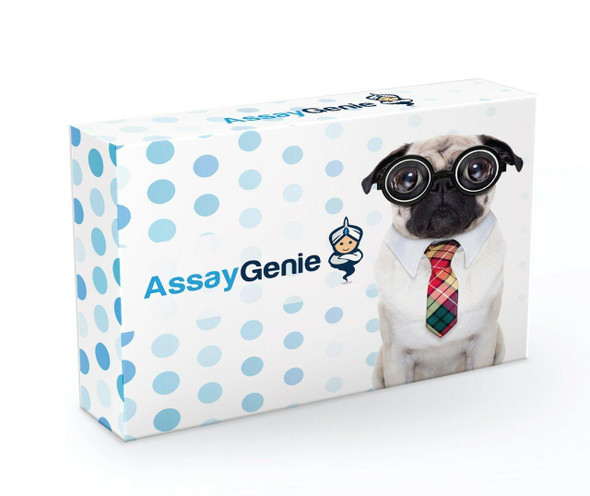Description
| Product Name: | Bovine FGF2 (147) Recombinant Protein |
| Product Code: | RPPB0211 |
| Size: | 50µg |
| Species: | Bovine |
| Target: | FGF2 (147) |
| Synonyms: | HBGH-2, HBGF-2, Prostatropin, FGF-2, FGB-b. |
| Source: | Escherichia Coli |
| Physical Appearance: | Sterile Filtered White lyophilized (freeze-dried) powder. |
| Formulation: | Lyophilized from a 0.2?m filtered concentrated solution in PBS, pH 7.4. |
| Solubility: | It is recommended to reconstitute the lyophilized Fibroblast Growth Factor-basic (147 a.a.) in sterile PBS not less than 100�g/ml, which can then be further diluted to other aqueous solutions. |
| Stability: | Lyophilized FGF2 although stable at room temperature for 3 weeks, should be stored desiccated below -18°C. Upon reconstitution Fibroblast Growth Factor-basic (147 a.a.) should be stored at 4°C between 2-7 days and for future use below -18°C.Please prevent freeze-thaw cycles. |
| Purity: | Greater than 97.0% as determined by: (a) Analysis by RP-HPLC. (b) Analysis by SDS-PAGE. |
| Amino Acid Sequence: | MPALPEDGGS GAFPPGHFKD PKRLYCKNGG FFLRIHPDGR VDGVREKSDP HIKLQLQAEE RGVVSIKGVC ANRYLAMKED GRLLASKCVT DECFFFERLE SNNYNTYRSR KYSSWYVALK RTGQYKLGPK TGPGQKAILF LPMSAKS |
| Biological Activity: | The ED50 as determined by a cell proliferation assay using murine balb/c 3T3 cells is < 0.1 ng/ml, corresponding to a specific activity of > 1.0 �107IU/mg. |
FGF-basic is a member of the fibroblast growth factor (FGF) family. FGF family members bind heparin and possess broad mitogenic and angiogenic activities. This protein has been implicated in diverse biological processes, such as limb and nervous system development, wound healing, and tumor growth. The mRNA for this gene contains multiple polyadenylation sites, and is alternatively translated from AUG and non-AUG (CUG) initiation codons resulting in 5 different isoforms with distinct properties. The CUG-initiated isoforms are localized in the nucleus and are responsible for the intracrine effect, whereas, the AUG-initiated form is mostly cytosolic and is responsible for the paracrine and autocrine effects of this FGF. The heparin-binding growth factors are angiogenic agents in vivo and are potent mitogens for a variety of cell types in vitro. there are differences in the tissue distribution and concentration of these 2 growth factors.
Fibroblast Growth Factor-basic (147 a.a.) Bovine Recombinant produced in E.Coli is a non-glycosylated polypeptide chain containing 147 amino acid and having a molecular mass of approximately 16.5kDa.FGF2 (147) is purified by proprietary chromatographic techniques.
| UniProt Protein Function: | Plays an important role in the regulation of cell survival, cell division, angiogenesis, cell differentiation and cell migration. Functions as potent mitogen in vitro. Can induce angiogenesis. |
| UniProt Protein Details: | |
| NCBI Summary: | |
| UniProt Code: | P03969 |
| NCBI GenInfo Identifier: | 122741 |
| NCBI Gene ID: | 281161 |
| NCBI Accession: | P03969.1 |
| UniProt Secondary Accession: | P03969 |
| UniProt Related Accession: | P03969 |
| Molecular Weight: | 17,250 Da |
| NCBI Full Name: | Fibroblast growth factor 2 |
| NCBI Synonym Full Names: | |
| NCBI Official Symbol: | FGF2�� |
| NCBI Official Synonym Symbols: | BFGF; FGF-2; HBGF-2�� |
| NCBI Protein Information: | fibroblast growth factor 2 |
| UniProt Protein Name: | Fibroblast growth factor 2 |
| UniProt Synonym Protein Names: | Basic fibroblast growth factor; bFGF |
| Protein Family: | Fibroblast growth factor |
| UniProt Gene Name: | FGF2�� |
| UniProt Entry Name: | FGF2_BOVIN |






